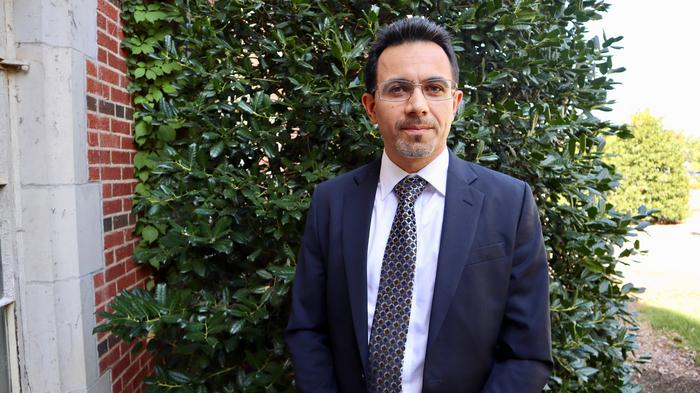NORMAN, Okla. (Oct. 17, 2023) — In collaboration, the University of Oklahoma has taken the lead in a Department of Energy project, with support from Kansas State University, to pioneer a new generation of reversible electrochemical cells. The cells have the potential to revolutionize energy storage by integrating seamlessly with fossil fuel assets.

Credit: University of Oklahoma
NORMAN, Okla. (Oct. 17, 2023) — In collaboration, the University of Oklahoma has taken the lead in a Department of Energy project, with support from Kansas State University, to pioneer a new generation of reversible electrochemical cells. The cells have the potential to revolutionize energy storage by integrating seamlessly with fossil fuel assets.
The project’s objective was to conduct an extensive study aimed at developing an energy storage technology capable of efficiently converting carbon dioxide emissions captured from fossil fuel assets into valuable fuels, such as methane, says Pejman Kazempoor, Ph.D., a professor in the OU School of Aerospace and Mechanical Engineering, Gallogly College of Engineering, who leads OU’s contribution to the project.
“One of the standout features of this reversible electrochemical technology is its ability to solve existing problems in the energy storage landscape, particularly its exceptionally high round-trip efficiency and durability. Unlike conventional energy storage technologies, this solution promises to minimize energy loss during the storage and retrieval process, making it a game-changer for the industry,” Kazempoor said.
The success of the OU and KSU collaboration has garnered international attention, with their achievements prominently featured in journals such as Nature Energy and Joule.
“The implications of this achievement extend far beyond the laboratory, as it opens up exciting opportunities for a more efficient and sustainable energy future,” said Abu Yousuf, Ph.D., a postdoctoral Fellow in the OU School of Aerospace and Mechanical Engineering.
Kazempoor says that by seamlessly integrating with fossil fuel assets and enabling the conversion of CO2 emissions into usable fuels, the technology holds the potential to usher in a new era of energy storage. The implications for reducing carbon emissions and enhancing energy efficiency are profound, offering hope for a more sustainable and environmentally friendly energy landscape, he adds.
About the project: The agreement, in effect from Feb. 28, 2021, to Aug. 30, 2023, was funded by the National Energy Technology Lab, Office of Fossil Energy. The project, titled “Reversible Methane Electrochemical Reactors as Efficient Energy Storage for Fossil Fuel Power,” received a grant of $312,504 under Award Number DE-FE0032005.
About the Gallogly College of Engineering: Engineering has been part of the University of Oklahoma since 1908. Today, the Gallogly College of Engineering is organized into seven schools and is one of the largest colleges on the Norman campus.



